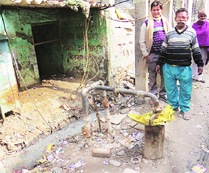Stay updated with the latest - Click here to follow us on Instagram
Where power flows through water pipelines
The water crisis became acute from 2005 when electricity supply led to a sudden rise in population.

The day Barack Obama arrived in Delhi is one that people in Asia’s largest illegal colony will remember for a while. On Sunday, several parts of Sangam Vihar received water supply — for 15 minutes, after 45 days.
As always, the occasion was marked by chaos as residents scuffled with those who provided the water, accusing them of favouring their supporters. For, the water here is not supplied by Delhi Jal Board (DJB) but mostly sold by supporters of politicians who control the main source —borewells.
In Sangam Vihar, power flows through the water pipelines.
Residents say it’s a business that has created many millionaires, some of whom operate a number of tankers. They add they have little choice but to pay Rs 100 for 15 minutes of water — available once a fortnight, a month or even two months —or Rs 700 for 2,000 litres from a private tanker.
In fact, all new tenants are first informed about their fixed “quota”, a few buckets a week, and every home looks like a water storage unit — utensils and buckets filled with water stand on terraces and indoors.
Kamlesh, mother of five daughters and a son, is livid at the “BJP men who control the borewell in her lane”. “When I requested them for more water, they said ‘Did you ask us before having so many children?’… And their leaders ask us to have 10 children.”
Joginder Khurana, an AAP supporter who manages a borewell, too was heckled by women who accused him of charging high.
According to residents, after the unauthorised colony came up in the 1980s, “some private individuals” installed borewells and laid pipelines to houses. The water crisis became acute from 2005 when electricity supply led to a sudden rise in population.
BJP candidate Dr S C L Gupta says when he was elected from here in 2008, the area had only 56 borewells. “I installed many borewells,” he says.
According to residents, the number of borewells during Gupta’s tenure was over 175, “most controlled by BJP men”. “They charged Rs 500-Rs 1,000 for a monthly 15-minute supply,” says Kalicharan, Kamlesh’s husband.
The current MLA, AAP’s Dinesh Mohaniya, says he “nationalised” 35 private borewells in his 49 days in office. “I made them government property and handed them to a small committee of local residents. They provided water at just Rs 50 per month. I also ensured the sealing of many private borewells,” he says. “After our resignation, local officials and DJB authorities did not cooperate with us in acquiring more borewells.”
Residents agree Mohaniya installed nearly 15 new borewells and “reduced water charges drastically”.
Since then, however, political interests appear to have taken over once again, with residents of BJP-dominated areas complaining that the borewells run by AAP supporters discriminate against them. A snapshot of this conflict comes in K Block where residents say three women beat up AAP supporter Omkar Chauhan some months ago and took charge of a borewell. “I requested him for an extra bucket. He did not, so I thrashed him,” Shakuntla laughs. However, the borewell has not been working for two months. “We have complained to the DJB, but no one listens to us,” says Shabana, another one among the three women.
At present, the area has 150 borewells, including 50 “sarkari” ones, each supplying to around 500 connections. This obviously is not enough; Sangam Vihar Police Station SHO Randhir Singh says “the maximum criminal cases here are registered following fights over water”.
The borewells have also depleted the water table. In the 1980s, Mohaniya says, water was struck at 60 ft; now “there is no guarantee” even at 750 ft.
Then again, most of the pipes that run from these borewells are cracked, and pass through muddy lanes, making the water unfit to drink. The Congress ruled the assembly for 15 years; the municipal corporation was with the BJP, which has three of the current four corporators of Sangam Vihar.
As for AAP, one of its big electoral promises has been 700 litres free daily to every home in Delhi. But residents of Sangam Vihar wonder if that promise can ever be implemented. Even if one counts 70,000 homes, AAP would need at least 50 million litres daily here. While Dr Gupta is sure Mohaniya would never be able to fulfil this promise, former CM Sheila Dikshit cautions against freebies: “People must pay for basic services and have a culture of conserving resources.”
It’s not a completely lost cause yet, though. The state government had laid pipes in most of Sangam Vihar during Gupta’s tenure. All that remains is connecting to individual households. But that can happen only when either the colony is authorised or the rules are amended to get DJB to supply here.